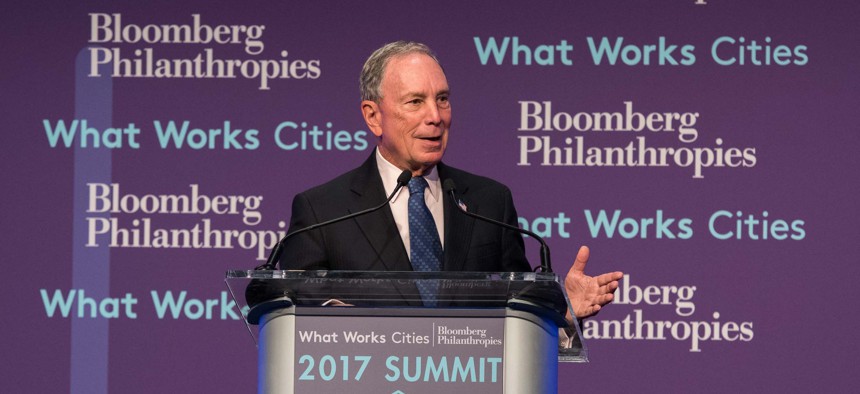What Works Cities Launches New Certification Program for Municipal Data Practices

Former New York City Mayor Michael Bloomberg Courtesy What Works Cities
As the footprint of the WWC network grows, “other cities will want to copy the cities that do well,” according to former New York City Mayor Michael Bloomberg.
NEW YORK — The Bloomberg Philanthropies announced a new certification program for municipal data-driven governance as part of its growing What Works Cities initiative on Tuesday.
“The certification will help cities know where to look for good practices,” former New York City Mayor Michael Bloomberg told a gathering in lower Manhattan that attracted more than 350 municipal leaders and practitioners from around the nation, who are some of the brightest minds in data analytics and performance.
The What Works Cities program, which was launched in April 2015 with a handful of mid-sized municipalities, has grown to now include 77 cities in 36 states that represent 25 million residents, including jurisdictions like Seattle, Lincoln, Nebraska; and Jackson, Mississippi. Ten new cities have been added to the WWC network including Augusta, Georgia; Miami, Florida; Lewisville, Texas; and Washington, D.C. Eventually, 100 cities will be included in the network.
The WWC program is managed by a coalition of organizations, including the Center for Government Excellence at Johns Hopkins University, the Government Performance Lab at Harvard University’s Kennedy School of Government, Results for America, the Sunlight Foundation and the Behavioral Insights Team.
Those organizations lend technical expertise to city hall teams working to tackle data and performance challenges, including creating open data policies, crafting strategies to make better decisions and improve local government performance.
The next step is the What Works Cities certification program, which will have silver-, gold- and platinum-level ratings for municipalities excelling in the application of data-driven governance strategies and techniques. Cities with populations of at least 30,000 residents will be invited to apply for the certification program.
“Other cities will want to copy the cities that do well,” Bloomberg told the What Works Cities Summit in a packed hotel ballroom near the World Trade Center.
Simone Brody, a veteran of the Bloomberg administration and executive director of What Works Cities, said that with the program, “we have a framework to make sure we’re having an impact. … It defines what good looks like,” while measuring progress against city goals and “taking stock of what works and what doesn’t.”
Bloomberg stressed that municipal leaders need to aim high if they want to improve services and quality of life in their cities. “We’ve got to raise our expectations,” the former mayor said.
While setting high goals can sometimes be daunting, there is expertise and insights available from the WWC coalition that can assist cities that commit to working with the program.
To date, the WWC team has worked on 126 projects, conducted 119 site visits and trained 723 people in city halls, according to Beth Blauer, the executive director of the Center for Government Excellence.
“We’re providing light-weight technical assistance, but you’re doing all the hard work,” Blauer told the crowd.

Baltimore Mayor Catherine Pugh, who addressed the summit at a morning session, said that she and other officials in Maryland’s largest city are dealing with a complex set of challenges, including trying to assist 76,000 residents who are unemployed and 3,000 who are homeless.
“I can can use the capacity that WWC has brought to Baltimore to focus on results,” Pugh said.

For Bloomberg, who made data analytics and performance a cornerstone of his 12 years at New York City Hall, local governments are laboratories for figuring out strategies and best practices for addressing common challenges.
“Cities are where the people are. Cities are where problems are. And cities are where the solutions are,” Bloomberg said.
Pugh, who said she’s been a fan of Bloomberg’s leadership on municipal performance for a long time, rehashed an idea that the former New York City mayor has previously promoted: “Good ideas become great ideas when you infuse them with others.”
Michael Grass is Executive Editor of Government Executive’s Route Fifty and is based in Seattle.
NEXT STORY: Microservices: The future of government IT






